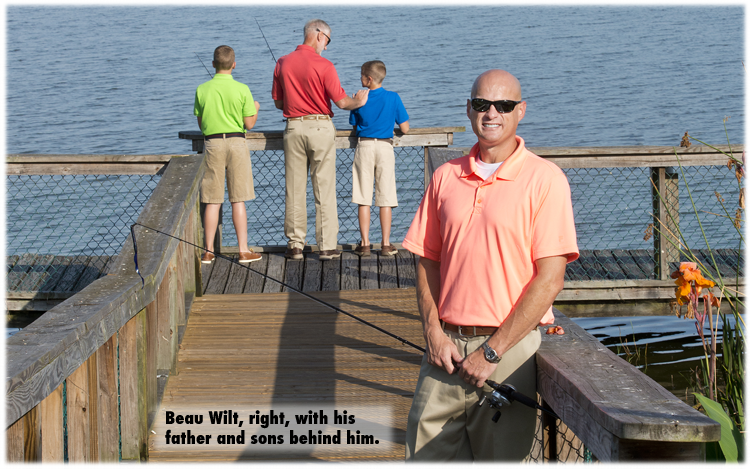Beau Wilt shares his story of survival and healing after a near-fatal accident
IF YOU’RE LUCKY, you’ll only ever hear the term “severe trauma” on the news or on a hospital television show. However, for people who have suffered the effects of a serious accident, major collision or other near-lethal mishap, “lucky” means they have gotten to know the inside of a hospital’s Trauma Unit as well as their own homes.
That’s how it was for Central Florida resident Beau Wilt after he suffered a serious accident in 2008. “I was in an ATV accident April 3, 2008,” he shares in his can’t-be-missed Southern drawl, recounting that he sustained “multiple injuries, including a fractured shoulder, a fractured lumbar spine and hip, broken nose, and both lungs were punctured.” He was in bad shape, but he maintains that “the worst was the severe traumatic brain injury. I had hemorrhaged into the third and fourth ventricles of the brain.”
Things didn’t look good for Wilt’s prognosis, but he was fortunate to find himself in the capable hands of the doctors, nurses, and staff at Lakeland Regional Health. “I was in the Trauma Intensive Care Unit (TICU) for seven weeks and later transferred to the trauma floor where I stayed for a week and then transferred to Joy Fuller for rehab,” he recounted at the Trauma Survivors Day held Friday, May 15, at Lakeland Regional Health Medical Center. Led by Olumide Sobowale, MD, FACS, the Trauma Medical Director at Lakeland Regional and a Polk County Medical Association member, the event offered a time for survivors, family and friends and health personnel to come together and celebrate both good luck and the positive outcomes that come from excellence in health care. The event’s theme of “Lives saved. Successes achieved. Friendships formed,” is one that hit close to home for Wilt.
“It was touch and go for some time,” he admits. “I am so thankful for the Trauma Unit, as well as all the doctors and nurses who took care of me and never gave up, even when the prognosis was not good. They were there for me. They were there for my mom and dad with words of encouragement and hope.” Wilt shares that the Trauma Unit nurses encouraged his mom to keep a journal — which she did, complete with pictures and entries — and that just looking at it, even seven years later, Wilt becomes “overwhelmed with gratitude” for those who performed his daily care and helped him to become well again.
Wilt and others like him are right to feel grateful. According to data compiled by U.S. Centers for Disease Control and Prevention, the most recent statistics available (from 2013) show that the leading cause of death for U.S. citizens older than one and younger than 45 is unintentional injury; it’s not very low on the list for the very young and the elderly, either. While not every injury is deadly, serious injuries and trauma can have long-lasting consequences. From suffering a nasty fall to sustaining a work or sports injury, to being in a serious traffic accident, there are many opportunities for experiencing a major injury that would warrant time in a Trauma Unit. Statistically, such injuries are more likely to happen to men than women, as anyone who has seen the disparity in the cost of auto insurance for a young man versus a young woman knows. It’s not that men experience more injuries overall than women; it’s that they are more likely to suffer certain kinds of trauma. For instance, men — especially young men — are more likely to sustain injuries and trauma in areas such as motorcycle accidents and being unintentionally struck by something or against something.
For those who suffer a trauma incident but make it through the initial injuries, no matter their gender, being in a top-notch Trauma Unit can make all the difference. “They saved my life,” Wilt says of Lakeland Regional Health. He also found more than just health care with LRHMC’s Trauma Unit. “I gained more than a friendship …,” he shares, reflecting on his time at Lakeland Regional. “I gained a family.”
After his release, unsure of returning to his successful career as a real estate agent, Wilt went back to school for physical therapy, but he found that his short-term memory was not yet up to speed to the point where he could maintain the academic level he wanted. He then turned back to the hospital that had helped him with his injuries and took a job as a transporter. “I wanted to be able to give back and be a part of that team that saved my life, and it was amazing. I got to meet the nurses and the doctors who saved my life … got to be friends with them. They have such compassion for patients.” He maintains that he found great purpose in being able to give something back. “Being able to talk to the people who were just like I was … who were sick just like I was; to be able to encourage them … I tried to plant that seed of encouragement; I was just in their shoes. That really helped me overcome all my issues.”
Now issue-free and as healthy as can be, Wilt has returned to his real estate career, but he maintains that he will never forget the people and the hospital that made it possible for him to walk God’s green earth and to be there for his sons. “I want to thank the Trauma Center as a whole,” Wilt continues. “I’m really just thankful for the hospital. They saved my life … now I want to give back to the hospital; whatever they need, I’m here to help them because they helped save my life,” he concludes.
It’s the best kind of luck — the kind that comes full circle.
CREDITS
story by ERIKA ALDRICH
photo by PEZZIMENTI
